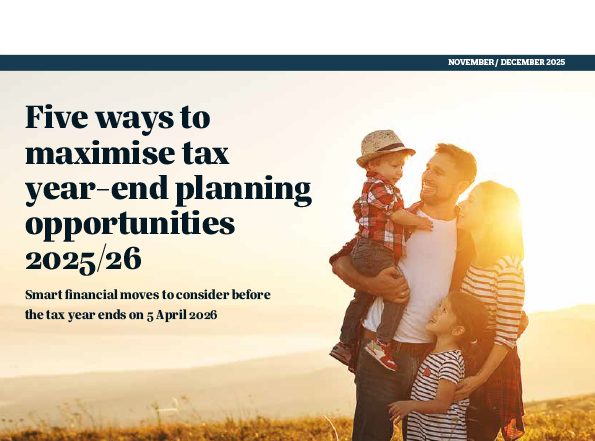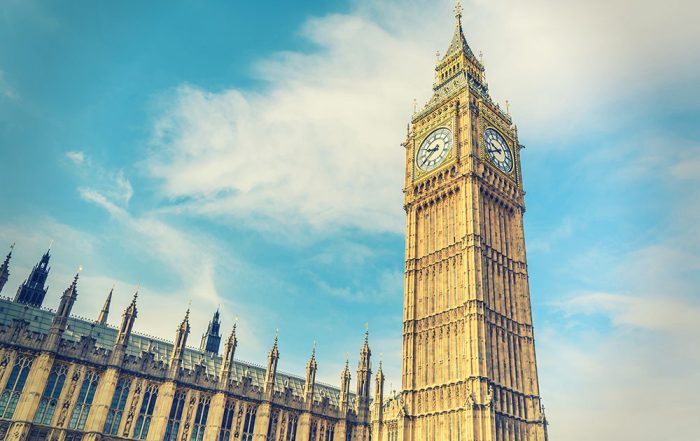Make the most of your financial situation before the deadline
The end of the tax year is fast approaching, ending on 5 April 2025. This is your opportunity to review your annual allowances and assess how best to make the most of them. With some significant changes to tax allowances in the 2024/25 tax year and further reductions expected in the future, planning ahead is key.
Using your allowances now could maximise your wealth by leveraging tax-efficient strategies and minimising liabilities. Here are practical steps to maximise your financial situation before the deadline.

Make use of your ISA allowance
Individual Savings Accounts (ISAs) remain one of the most efficient ways to save and invest tax-efficiently. The annual ISA allowance for the 2024/25 tax year is £20,000. Any gains you make within an ISA shield you from Capital Gains Tax (CGT), making it a valuable option, especially for higher or additional rate taxpayers. Furthermore, you pay no tax on interest or dividends earned within an ISA.
If you’re married or in a registered civil partnership, as a couple, you can contribute up to £40,000 into your combined ISAs, thereby increasing your overall tax-efficient saving potential. You might also consider the ‘bed and ISA’ technique, where you sell non-ISA investments to realise a capital gain and reinvest the proceeds within an ISA. This can be effective but may involve a temporary period out of the market, and obtaining professional advice is recommended.
Boost your pension contributions
Contributing to your pension is another effective way to maximise tax relief. For most individuals, the maximum tax-relievable contribution for the 2024/25 tax year is £60,000 or 100% of your earnings, whichever is lower. However, high earners should be mindful of the tapered annual allowance, which reduces your limit by £1 for every £2 your income exceeds £260,000. The minimum annual allowance for those affected by tapering is £10,000. The money purchase annual allowance (MPAA) is also set at £10,000 per tax year. This means if you have flexibly accessed your pension, the maximum amount you can contribute to your defined contribution pensions while still receiving tax relief is £10,000.
Even if you don’t have an income but are under 75, you can still contribute up to £2,880 into a pension, with tax relief boosting this to £3,600. Pension contributions from both personal and workplace schemes count towards your annual limit. Breaching your allowance will result in tax charges, so understanding your limits is crucial to avoid unnecessary penalties.
Plan for financial gifting
Another allowance worth considering is your entitlement to make tax-free financial gifts. Each tax year, you can gift up to £3,000 without it being subject to Inheritance Tax (IHT). You can carry forward one year’s unused allowance if not used the previous tax year, potentially gifting £6,000 without tax consequences.
Additionally, you can give multiple gifts of up to £250 each to different individuals in the same tax year, provided you don’t combine these with your £3,000 annual exemption to the same recipient. Larger gifts, such as those intended for property deposits for children, may also be exempt from IHT if you live for at least seven years after making the gift.
Make the most of your CGT allowance
Capital Gains Tax regulations offer an annual exemption, allowing you to make tax-free gains of up to £3,000 in the 2024/25 tax year. This allowance doesn’t roll over to subsequent years, so it’s worth using before the deadline. This can help you minimise your future CGT liability.
Spouses and registered civil partners can transfer assets between themselves to utilise their annual exemptions, effectively doubling their tax-free gains. Investments held within ISAs or pensions are also protected from CGT, offering additional options to shield your wealth.
Review your Personal Allowance
Your Personal Allowance allows you to earn up to £12,570 tax-free annually. Couples can optimise their tax liability by transferring assets to the lower rate taxpayer in the relationship. If one partner’s income falls below the personal allowance, the Marriage Allowance could allow up to £1,260 of the unused allowance to be transferred to the higher earner, resulting in a tax saving of up to £252.
This approach is particularly useful for couples with a significant disparity in income and should be part of any comprehensive financial review before the tax year ends.
Seek expert professional advice
Navigating tax regulations and allowances can be complex, and getting it wrong can prove costly. Discussing your options with us will ensure you make strategic decisions tailored to your circumstances. We’ll help you understand the intricacies of tax reliefs, exemptions and allowances while identifying the best opportunities for you.
THIS ARTICLE DOES NOT CONSTITUTE TAX, LEGAL OR FINANCIAL ADVICE AND SHOULD NOT BE RELIED UPON AS SUCH. TAX TREATMENT DEPENDS ON THE INDIVIDUAL CIRCUMSTANCES OF EACH CLIENT AND MAY BE SUBJECT TO CHANGE IN THE FUTURE. FOR GUIDANCE, SEEK PROFESSIONAL ADVICE.
THE FINANCIAL CONDUCT AUTHORITY DOES NOT REGULATE TAX ADVICE AND WILL WRITING.THE VALUE OF YOUR INVESTMENTS (AND ANY INCOME FROM THEM) CAN GO DOWN AS WELL AS UP, WHICH WOULD HAVE AN IMPACT ON THE LEVEL OF PENSION BENEFITS AVAILABLE.
YOUR PENSION INCOME COULD ALSO BE AFFECTED BY THE INTEREST RATES AT THE TIME YOU TAKE YOUR BENEFITS.
Contact Us Form
Please complete this form if you wish to send us your questions or if you would like to request a call back.
We look forward to speaking with you.
Recent GWM articles that may be of interest
Smart Money January/February 2026
Smart Money January/February 2026 Welcome to the November/December 2025 edition of Smart Money. [...]
Smart Money November/December 2025
Smart Money November/December 2025 Welcome to the November/December 2025 edition of Smart Money. [...]
Autumn Budget 2025: Key Financial Planning Implications for Business Owners
The Chancellor delivered the Autumn Budget on 26 November 2025, outlining significant changes across personal [...]
Why remaining invested supports long-term growth
Unlocking the potential of your investments and securing your financial future When it comes to [...]
Why protection matters
Do you have a safety net for you and your loved ones in case the [...]
Why has a lifetime gifting cap raised concerns?
Proposed policy would fundamentally change how wealth is transferred across generations Concerns are growing about [...]







